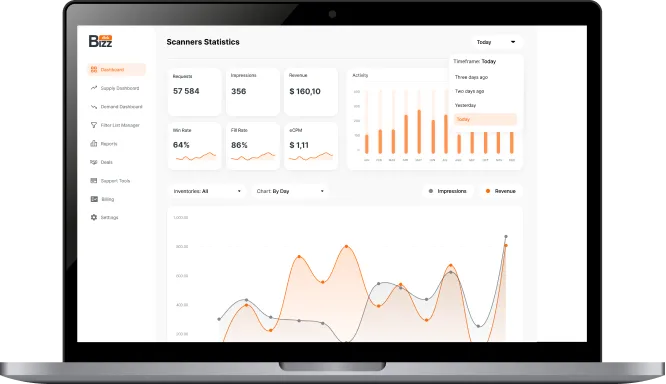3 Reasons to Use Blockchain for Ad Transparency
.webp)
By 2023, the intersection of the two industries of blockchains and programmatics seems inevitable. Ad spending in the Digital Advertising market is projected to reach €638.50bn by the end of the year. The last-named's rapid growth creates problems that only blockchain technology can solve.
Historically challenged by issues such as ad fraud, viewability discrepancies, and a pervasive lack of trust, the programmatic advertising industry is on the verge of a revolution. So, let's enter blockchain technology, a decentralized, immutable, and trust-enhancing innovation that has the potential to solve these long-standing problems.
In this article, we describe 3 key reasons to leverage blockchain for advertising transparency.
Current Ad Transparency Issues
The world of advertising faces three major issues when it comes to clarity and honesty: ad fraud, viewability, and trust.
At the forefront is the pervasive problem of ad fraud, which has the potential to consume significant portions of advertising budgets. Ad fraud involves deceptive practices in which illegitimate entities generate fraudulent clicks, impressions, or interactions, diverting ad spend away from authentic advertising exposure.
Another significant challenge is viewability. Viewability issues arise when ads are delivered but may not appear in locations or contexts conducive to attracting real human attention.
Advertisers have concerns about the effectiveness of their investments and the reliability of the metrics provided. Similarly, publishers may have doubts about the transparency and fairness of compensation, while consumers may question the authenticity of the content they encounter. This affects everyone involved in advertising — the people who want to advertise, those who show the ads, and those who see them. Obviously, these issues need to be addressed.
Blockchain's Role in Ad Transparency
Blockchain technology, known for its cryptographic foundation and decentralized nature, offers a solution to these persistent problems. At its core, blockchain serves as an immutable ledger of ad transactions that is transparent and verifiable. Think of it as a secure digital record book that can't be altered. It keeps a clear record of ad transactions so everyone can see what's happening.
With smart contracts, it can also ensure that things are verified and paid for automatically, without confusion or error. And because the information on the blockchain can't be tampered with, it makes everything super secure and helps everyone trust the advertising process more.
Three Reasons for Blockchain Adoption
Blockchain Improves Trust and Accountability
Due to the opacity of the black box system (i.e., the current advertising ecosystem), ad platforms inherently face a credibility problem. The lack of transparency in any system can invite untruthful or misleading information.
Blockchain brings an unprecedented level of transparency to ad spending and performance. Advertisers can see exactly where their dollars are going and how effective their campaigns are. This newfound transparency fosters trust among all parties involved.
Help to Combat Ad Fraud
Blockchain's decentralized architecture is a powerful weapon against ad fraud. It enables real-time detection and prevention of fraudulent activity, significantly reducing wasted ad budgets and increasing ROI.
Blockchain's implementation of smart contracts is proving to be a strong force against ad fraud. Smart contracts are like self-executing agreements written in code that directly establish the terms between buyers and sellers. When pre-defined conditions are met, these contracts execute automatically, bypassing the need for intermediaries. This automated execution significantly reduces the opportunity for fraudulent activity and increases the integrity of advertising transactions.
Ensure Data Privacy and Security
In an era of heightened privacy concerns, blockchain's ability to protect user data in a decentralized environment is a boon. It reduces the risk of data breaches, assuaging fears and ensuring compliance with regulatory frameworks.
From a user's perspective, this situation highlights a significant lack of control over their personal data when navigating the web. Despite the options available, such as clicking "unsubscribe" or blocking pop-up ads, it often feels like an endless game of whack-a-mole — data tracking persists as long as you continue using the Internet.
However, the integration of blockchain technology into advertising promises to shift the paradigm by giving users more control over their data.
Is It Even Possible to Use Blockchain in AdTech?
IBM has embarked on a mission to revolutionize the advertising supply chain, bringing transparency and resiliency with its characteristic enthusiasm for blockchain technology. Working closely with Mediaocean, a prominent advertising and analytics platform, IBM is using a blockchain-based distributed ledger to provide marketers with invaluable data insights. This innovative approach carefully documents every aspect of marketing activity, helping to curb wasteful resource allocation, eliminate middlemen, and expose fraudulent practices.
The future of advertising is about to be rewritten.
Conclusion
The future holds immense promise for blockchain's role in ad transparency. As the technology matures, we expect its adoption to grow exponentially, opening the way for greater accountability and trust in the advertising industry. Emerging trends, such as the tokenization of ad inventory and the development of decentralized ad platforms, are likely to reshape the advertising landscape.
Its capacity to foster trust, combat fraud, and ensure data security positions it as a catalyst for transformative change.
